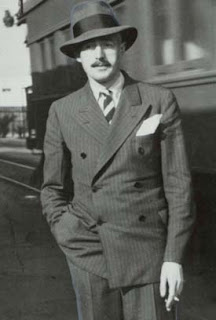
In the midst of the book reading and movie watching challenges
hereabouts, I decided to combine the two to write about one of my
favourite authors, whose small body of work has been the basis of, or
has influenced, some of my favourite films.
Dashiell Hammett wrote just five complete novels and a handful of
short stories. He wrote a new kind of detective fiction, drawing from
his own experiences as an actual private detective for California’s
Pinkerton Agency. The style became known as “hard-boiled” – lean
descriptions of ugly people in ugly places doing ugly things.
Sympathy was hard to find, but Hammett was careful to make his
anti-heroes just heroic enough – as cynical as things got, there was
always one guy willing to crack wise and (eventually) do the right
thing. And hopefully get paid for it.
I’ve broken my deranged rambling into two parts, for easier digestion.
The first covers the thematically-related Red Harvest (1929) and The
Glass Key (1931). The second will cover his most famously adapted
books, The Maltese Falcon (1930) and The Thin Man (1934).
1) ‘Red Harvest’ and ‘The Glass Key’
The Pinkerton Agency was notoriously involved in labour disputes and
strike breaking in the era that Hammett worked for them. This
experience informed his books Red Harvest and The Glass Key, two
novels with a number of shared elements, in particular the backdrop of
a small town being fought over by violent gangs and unscrupulous local
magnates.
Hammett had created a new type of detective fiction in his short
stories through the 20s, combining a flair for the drama of fiction
with the dour and seedy grit of his real life experience. His first
novel, Red Harvest, was the brilliantly executed culmination of this
period, and was a true watershed in crime fiction.

The protagonist is the Continental Op, the nameless actor in many of
his stories to date with whom he laid the template for the PI who lets
people believe he is more crooked than he really is. His client is
already dead by the time the Op reaches “Poisonville”, and he solves
that murder before fulfilling his contract to clean up a town riven by
violent factions, playing them against each other, even though at
times it seems like he is the only one who wants the town cleaned up.
If there are pieces of the story that seem familiar, that should not
be surprising, as many elements have been incorporated by future
storytellers. These include Akira Kurosawa and the Coen Brothers, but
although the influence of Red Harvest is clear on the films Yojimbo
and Miller’s Crossing, the filmmakers themselves identify the works in
question more closely with another Hammett novel, The Glass Key.

The Glass Key shares a similar storyline of a powerful local figure
attempting to hide behind, and profit from, criminal gangs, and a
smaller player pitting opposing sides against one another to quell
gang war. Miller’s Crossing, unfairly one of the more overlooked Coen
Brothers movies, is in part a very close adaptation of the book, but
there are a number of significant departures. They skillfully take the
core of Hammett’s story and adapt it where necessary to make the
result more characteristically a Coen Brothers film, something even
starker and more unsettling than the source material.


The Glass Key had already been adapted by Hollywood a couple of times
before. I haven’t seen the 1935 version but the more famous of the
two is the 1942 noir classic featuring an amazing Veronica Lake and
Alan Ladd. As with Miller’s Crossing, the makers of The Glass Key
were careful to make the material fit their ends, and in this case the
result is both a Hollywood movie of the era and an important
development in the budding noir genre. The former part of that of
course means that the plot is simplified and the politics are reduced
to the background in favour of the love story. Again though, the
license is taken adeptly, and the resulting film, while not a
completely faithful adaptation, is stronger for it.

The Glass Key is a wonderful film and well worth looking up. I was
very fortunate to be able to see in a cinema once and it remains one
of my favourite movie experiences. Miller’s Crossing is also very
much recommended. I have skipped over Yojimbo here but that film
certainly deserves its strong modern reputation, and of course it
endowed the influence it drew from Hammett’s novels on the several
notable films that were in turn influenced by it. A movie of Red
Harvest was made in 1930 which I have not seen, but which has a poor
reputation.
The books themselves are both very strong. Hammett had a gift for
devising involved plots and then executing them without confusion, and
that shows up in these novels more than any others. The characters
are typically boldly drawn and the action is paced and addictive. Red
Harvest in particular is considered perhaps Hammett’s finest work.
The author himself, however, cited The Glass Key as his favourite of
his own novels.
-Lee B.









No comments:
Post a Comment